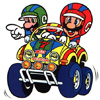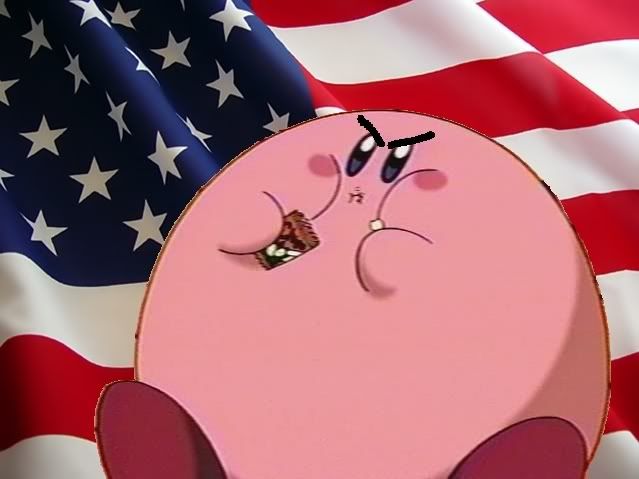|
|
Post by Hiker of Games on Nov 26, 2007 9:08:44 GMT -5
Fryguy! Marry me!
Finally someone agrees with me about Sunshine being better than Galaxy. In many ways, Galaxy felt a lot like the first SMB. Which isn't a bad thing... but you can never go back. In SMB, you're pursued by an invisible 'no going back' wall. In Galaxy, you're pursued by a design gimmick that prevents you from backtracking. There's a lot of challenge there, since you can miss alternate routes, but it's divided by short clips of Mario flying through space. Thankfully these animations never got old, but had they been longer...
And I loved Sunshine for the reasons Fry specified. It was a real, tangible location in the Mario world. Sunshine explored everything it could about the island. Despite all worlds being in a tropical setting, none were alike. Yet each one was important. And one of my favorite bits was seeing a familiar world in the background. Unlike Galaxy where collecting 120 Stars never seemed to have a reason, in Sunshine collecting the Shines was very purpose-driven. Sure the three coin challenges might not have been, but the evolving events of each world was very satisfying.
But mainly... yeah the free roam was just great. The primary Delfino city was leaps and bounds better than 64 or Galaxy's gateway worlds. Each world was memorable because there were so many places to go. Everything was tied together so seamlessly. Sometimes I'd use the super speed nozzle on FLUDD to race through the streets. Not to get from Point A to Point B... just because it was fun to do.
And FLUDD. How can FLUDD be forgotten? People give the guy a poor wrap, but I'd take him over the 64/Galaxy powerups any day. While Galaxy reduced platforming to having to mentally keep up with where Mario is standing, FLUDD in Sunshine actually gave Mario new abilities. There was nothing more enjoyable that backflipping off a platform then hovering to the one above it. Or walljumping a huge cliff and then hovering over to a platform. It gave us the ability to scale heights that we never would have done in 64 for fear of falling. FLUDD was a genius gameplay tool. It's such a shame that people's poor opinion of Sunshine means we'll never see that kind of platforming again.
|
|
|
|
Post by Fryguy64 on Nov 26, 2007 9:59:31 GMT -5
Super Mario 64 planted Mario's feet firmly on the ground. He could jump, wallkick and so forth, but for the most part he was running along flat surfaces and fighting enemies and bosses. Grab the Flying Cap, and suddenly Mario is not restricted by such things, and no part of the level is out of his reach.
Sunshine took the ground away, and the stages went up and up. Sometimes you'd start low, but you'd always end up teetering on some narrow, high-up platform, jumping across huge drops to the very bottom of the stage. FLUDD was your lifejacket. You might just miss that platform, but you don't have to start from the very bottom again - just fire up FLUDD and grab the edge.
All this talk of Galaxy being the 3D SMB3 immediately made me think of it being more like a 3D SMB1, due to the lack of being able to turn back. The only way it's like SMB3 is that the levels are shorter and easier than 64 or Sunshine, but there's a lot more of them.
|
|
Deleted
Deleted Member
Posts: 0
|
Post by Deleted on Nov 26, 2007 12:09:42 GMT -5
I gotta be honest--I do miss vertical FLUDD exploration. And the fact that a lot of stage concepts are recycled or worse--in the case of Golden Leaf Galaxy--simply mirrored and heavily reduced versions of previous levels makes me miss Sunshine's bigger-and-fewer-and-distinct areas. You could really explore those places, too; with Galaxy, there's the big main path and the occasional splitting side-path, and the results aren't always worth the experience.
|
|
|
|
Post by Manspeed on Nov 26, 2007 16:22:24 GMT -5
To tell the truth, I love the whole huge-ass free-roaming aspect of Sunshine, but it would've helped a ton if the whole game wasn't centered on a single theme. Try to imagine that same mechanic but applied to the entire Mushroom Kingdom. That's what I want to see in a big Mario game. As for FLUDD, that part could easily be an application of the classic Mario power-ups into the 3D setting, without making them temporary or whatever like the SM64 power-ups.
I want to be in the same situation as Fry said, except on a big green mountain instead of a coral reef, and using a raccoon tail instead of a water pump. That's pretty much the gist of it.
|
|
|
|
Post by Nester the Lark on Nov 26, 2007 23:32:03 GMT -5
I'm curious to see what Edge magazine rated this game. I trust their opinion, and I doubt they'll give it the "truly revolutionary" 10/10 that they have awarded to just 6 games in over a decade. Guess what, Fry. Edge gave it a 10.Still trust them? |
|
|
|
Post by Fryguy64 on Nov 27, 2007 4:47:22 GMT -5
Hmm, thought I'd mentioned that here already. ;D Here's my response: fryguy64.deviantart.com/And no, I am starting to question their editorial standards. That's three 10/10s in as many months. Something's broken at Edge magazine  |
|
Ike-Mike
Pikpik Carrot
 Ness ... I feel-a ... happy ...
Ness ... I feel-a ... happy ...
Posts: 166
|
Post by Ike-Mike on Nov 27, 2007 11:24:23 GMT -5
I could never really call the levels in Sunshine free-roaming. Some sections of the areas being locked for certain chapter and being restricted on the order in which you have get the shines isn't what I call free-roaming.
And I guess most of the camera issues came from being used to always place the camera behind Mario (well at least that's how it was in my case).
But on the other hand, I never understood what all the fuzz on OoT is about (probably because I played through TP before getting this game).
|
|
|
|
Post by Nester the Lark on Nov 27, 2007 11:27:23 GMT -5
Hmm, thought I'd mentioned that here already. ;D Here's my response: fryguy64.deviantart.com/And no, I am starting to question their editorial standards. That's three 10/10s in as many months. Something's broken at Edge magazine  I thought you might've seen that already, but if you mentioned it on the forum, I missed it. Sorry about that. Anyway, if giving out perfect 10's too often causes you to doubt the integrity of their rating scale, does that also effect your view of games on the lower end of the spectrum (under 5)? Just wondering if it goes in both directions. |
|
|
|
Post by Fryguy64 on Nov 27, 2007 15:49:11 GMT -5
Edge is usually great in their rating system. 5 means average, 10 means perfect, and 1 means literally unplayable. Before now I have tackled games they rated low even though I thought I'd love 'em, but they turned out to be right.
To be honest, I've seen them hand out more 10s than I've seen them hand out 1s or 2s. I'm not sure I've ever seen a game rated 1 in Edge magazine... If it's so bad it's barely playable, then it's a 2 (the key word is barely).
If they suddenly started dishing out under 5 scores to average games, or loads of 1s or 2s to just below average games then yes, I would be just as perturbed as I am about them dishing out 10s to imperfect games that probably won't get played after a month or two.
|
|
|
|
Post by Smashchu on Nov 27, 2007 21:47:29 GMT -5
Edge is usually great in their rating system. 5 means average, 10 means perfect, and 1 means literally unplayable. Before now I have tackled games they rated low even though I thought I'd love 'em, but they turned out to be right. To be honest, I've seen them hand out more 10s than I've seen them hand out 1s or 2s. I'm not sure I've ever seen a game rated 1 in Edge magazine... If it's so bad it's barely playable, then it's a 2 (the key word is barely). If they suddenly started dishing out under 5 scores to average games, or loads of 1s or 2s to just below average games then yes, I would be just as perturbed as I am about them dishing out 10s to imperfect games that probably won't get played after a month or two. One of the problems with the 10 point system is it gives to few 1s and 10s. With a 5 point, everything is clear. It says what games are great and what games are not. Simple. No BS. The you have the 10 point. With many publications, not just Edge, they rarely give 1s or 10s. If fact, the majority of their scores will be between 5-9, which is 5 different numbers (see what I mean). There is also a lot of confusion in scoring as some use 7 as the average, others use 5. This creates confusion on so many levels. But, that's just me. Of course, it really isn't a problem at all. 2 of those 3 games deserve 10. The Orange Box for one was 5 games for 50 bucks. Heck, the majority of those games would score 9 or better alone. Now each one is 10 bucks. That alone makes it worth a 10. Halo the only one that doesn't deserve a 10. Simply put: same game little changes, easy campaign, over hyped. I also explained everything why Mario Galaxy is considered revolutionary but by your comment I'm not sure you looked at it (I'll give it a check though). You do need to realize that you are the majority opinion, so by saying Galaxy doesn't deserve a 10, you are wrong (sort of). Many critics have praised the game, so why is it a problem that one more does the same. Where you hoping that the critic(s) you loved and respected didn't share your opinion which very few people share? It will happen to everyone. It's not a problem with them as they were on par with other critics about their opinion (by which I mean they aren't a rouge critic give a game a score thats incredibly far from the average). It may be your inability to accept that people like this game more then Sunshine. Oh, and I may have wanted to quote the post above it. EDIT: Oh, you did see it What is "revolutionary" had changed in terms of a definition. What you fail to realize is it added something that has yet to be done in a game, ever. Gravity. Many games have tinkered with it hear and there, but never making it a full force part of the game. Platformers are all about jumping, so gravity is a natural fit. Changing the way you interact with objects and play the game. It becomes part of the experience, and part of the fun. But you claim that in order to be revolutionary, it has to make it to where everyone else has to follow or be left behind, which is not entirely true. Your definition is very narrow, and is not how it is used amongst the gaming populace. Or, at least, what the context seem to point to. Lets look at Portal. Here is a game that takes FPSs in a whole new direction. It, like Mario Galaxy, had elements that can move into other games. Here we have a game where the sole purpose is using momentum and smarts to get to the next area. You have to transverse using two points to get where you want to go. Or, lets look at Half-Life 2. Here we have a game where physics is put to the test and put into the foreground. Not only does the game use higher level physics, but also makes them part of the game. It makes them part of the experience. Lots of puzzles are based around the games physics engine. But all these games are revolutionary. The definition, how the industry uses it, is something that changes the way we think and interact with the games. By your definition, none of these are revolutionary. Not every games uses physics like Half-Life 2 does, but everyone calls it a revolution. Portals changed how we think about shooters, and they call it revolutionary. Mario Galaxy takes platforming in a new direction and adds gravity as a gameplay element. See a pattern. Your definition is very narrow. If a game is to be revolutionary, it needs to change how we think and interact with the game so that it may be realized in other games and genres. |
|
|
|
Post by Fryguy64 on Nov 28, 2007 4:32:57 GMT -5
If a game is to be revolutionary, it needs to change how we think and interact with the game so that it may be realized in other games and genres. I'm not sure if this is your view, or you are simply paraphrasing my view. Saying my definition is too narrow... what the fuck? Any dictionary GIVES you the fucking definition! I'm not being too narrow, I'm just not being a fucking idiot! But I love the fact you say "my definition differs from the industry's" - of course it does! The "industry" has far too many synonyms for "excellent" and "awful", and now they're picking on phrases that actually mean different things. I'm glad my definition is based in the English language. If only more journalists used the English language properly, we might actually have some decent game reviews. Super Mario Galaxy is an instant classic, original, innovative, fun and excellent. Which of those do YOU mean when you say "revolutionary"? Because I mean "will heavily influence later games in this genre". Just like an actual revolution requires it to be influential in some regards. On the other point, Edge's system is good, as it means they give out scores under 5 and scores over 5. Nearly every other magazine seems to class "average" as 75%, which is retarded. That's the problem with the videogame journalism industry. It's full of smacktards. |
|
|
|
Post by Sqrt2 on Nov 28, 2007 5:13:26 GMT -5
I'd describe Super Mario 64 as revolutionary, but it's not something I'd use to describe either Sunshine or Galaxy. This is mainly because they're both built on SM64's gameplay style. Sure, Sunshine and Galaxy are different from SM64, but they both have SM64's core features running through them.
SM64 is still (I think anyway) the benchmark game that all others are compared against.
Oh, and I sure wish the camera allowed for 360 degree rotation, but maybe that's something for the next Mario platformer to address.
|
|
|
|
Post by kirbychu on Nov 28, 2007 7:00:15 GMT -5
It may be your inability to accept that people like this game more then Sunshine. Lawl. What you fail to realize is it added something that has yet to be done in a game, ever. Gravity. Many games have tinkered with it hear and there, but never making it a full force part of the game. So... if I made a platformer set entirely in strong winds, will I be a revolutionary? It's been done hundreds of times before, but nobody's ever made a whole game with it, right? How about a game set entirely in quicksand or a lunch box? The gravity gimmick isn't new. It's been done in billion games as early as the early 90's. Nintendo made a game entirely out of it (and really, not even that. I can think of several places where the floor acted the same as usual with no actual gravity), and good for them. That doesn't make it revolutionary, it just means they were the first company to think it was a good enough gimmick to be used constantly. But you claim that in order to be revolutionary, it has to make it to where everyone else has to follow or be left behind, which is not entirely true. Having some trouble with definitions lately, huh?  Revolution Revolution
a drastic and far-reaching change in ways of thinking and behaving.A Revolution, by definition, changes the way we think about things, and therefore affects future games. Galaxy does not... can not... do this. The only future game Galaxy is going to affect is Super Mario Galaxy 2, and I doubt that's ever going to happen. Gaming will carry on regardless. Perhaps shrug it's shoulders as it watches Galaxy speed off into the past. It's a great game, but not a Revolutionary game. |
|
|
|
Post by Fryguy64 on Nov 28, 2007 8:44:54 GMT -5
It may be your inability to accept that people like this game more then Sunshine. Missed this bit. I am perfectly fine with people preferring it to Sunshine, in the same way that I prefer Sunshine to Galaxy. That's not my issue, and I haven't argued that. If I'd been arguing that Sunshine was revolutionary (which I'm not) then yes, I would be being inconsistent... and wrong! As far as games go, I preferred Sunshine and its gimmicks to Galaxy and its gimmicks. Smashchu, you are being very rude and your lack of tact is making people angry with you. Please be more careful in how you word things. |
|
|
|
Post by mopinks on Dec 2, 2007 9:22:08 GMT -5
I've always loved Sunshine more than I loved Mario 64, even though it's badly hurt by a lot of glaring little flaws. I mean, blue coins? HELL ON EARTH. not to mention that choosing certain shines within a level makes it impossible to actually collect 100 coins, forcing you to start over if you're going for the 100-coin stars. the game as a whole is wonderful enough for me to overlook those little missteps, though. and I liked the camera, too!
that said, I think Galaxy easily blows Sunshine out of the water. I do miss all the free-roaming exploration, and the hub world isn't nearly as great, but it's a small price to pay for all the inventiveness on display. maybe the next game will have the best of both worlds?
|
|












